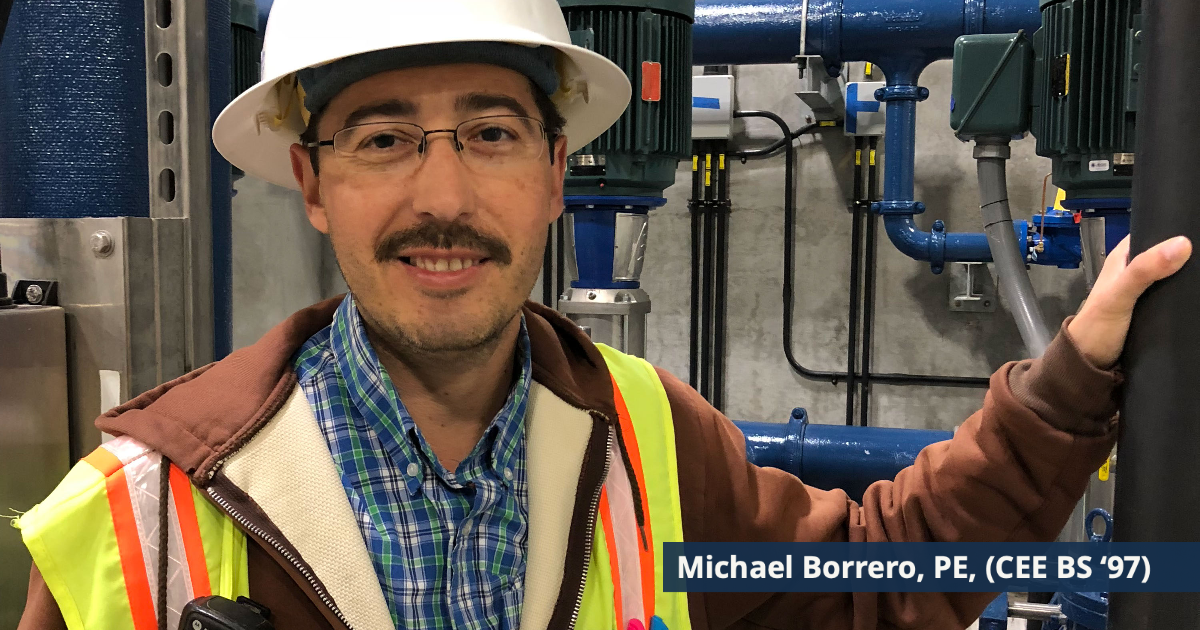
Building Better Water Infrastructure Across the US
Having grown up in an under-served area, Michael Borrero, PE, (CEE BS ‘97) entered Carnegie Mellon with firsthand knowledge of water infrastructure problems—and a drive to fix them.
“Whereas other areas had city water and sanitary sewers, we relied on domestic wells for water and septic systems for wastewater treatment on very small lots,” he recalls. “If your well water came from the surficial aquifer, which if you’re poor is likely, you were very susceptible to drinking water high in nitrates.”
High nitrate intake can lead to serious health problems, including methemoglobinemia, or blue baby syndrome—known to cause shortness of breath, nausea, diarrhea, lethargy, loss of consciousness, and seizures in infants. Extreme cases can lead to death. Excess nitrates may also cause birth defects, thyroid disease, and increased risk of cancer.
Seeing these issues in his community inspired Borrero to take action. With professor David Dzombak as his CEE advisor, Borrero completed his senior project on water contamination in his neighborhood and issued the report to the county health department. Today, he says, city services have finally been extended to the area.
"Getting a degree from a world-class university like CMU is not an easy thing to do. It’s an accomplishment that allowed me to mentally accept that I could take on difficult engineering projects..."
“These are very important problems,” says Borrero. “We think developing countries are the only places where you see these kinds of issues, yet our own citizens struggle with water infrastructure problems and inequities all the time.”
Now, as a Design Manager and Associate Vice President for Carollo Engineers, Borrero continues to tackle challenging problems in the water and wastewater industry, leading multidisciplinary teams in the delivery of treatment and infrastructure solutions. Borrero has worked for Carollo, the largest water-focused engineering firm in the US, for 15 of his 25 years in the field and recently became manager of their Seattle office.
His first project with Carollo was a massive one: serving as assistant resident engineer in the design and construction of a new water treatment plant for the City of Austin. Following that four-year project, Borrero became resident engineer on another large and geotechnically complex project—designing and constructing the Oak Harbor Clean Water Facility, located in an environmentally sensitive area on the Puget Sound in Washington state. Using Membrane Bioreactor (MBR) treatment technology, the new facility replaces two aging facilities that were difficult to maintain, ill-equipped to meet desired quality standards, and lacked the capacity to support a growing population.
“The Oak Harbor facility was a once-in-a-career type project,” says Borrero. “Puget Sound is impacted with a lot of pollutants, and we're doing our part to reduce that. It's a small contribution, but an important one. You have species like orca struggling in the sound, and we’re making the waters better, trying to help bring life back into the ecosystem, while also providing the Oak Harbor community with modern and reliable wastewater services.”
The Oak Harbor Clean Water Facility has since won multiple engineering and construction management awards, including a 2019 Project of the Year award from the American Public Works Association.
In spring 2022, Michael returned to CMU with his family to celebrate his 25th reunion and Spring Carnival. The visit was a chance to see not only what has changed on campus but also what has stayed the same over the years. “The CEE reunion breakfast was a real highlight for me, because I can see that the ethos of caring is still alive and well, even as the department’s rankings continue to rise,” he says.
Looking back, Borrero believes that his time at Carnegie Mellon and experiences in CEE were vital to giving him the skills and confidence to grow his career.
“The skills needed to navigate the academic demands and rigorous coursework and learning to manage work-life balance as a student directly translated into my professional skills as a consultant,” he says. “Getting a degree from a world-class university like CMU is not an easy thing to do. It’s an accomplishment that allowed me to mentally accept that I could take on difficult engineering projects with challenging budgets, schedules, and politics and see them successfully completed. This has made all the difference in my career.”